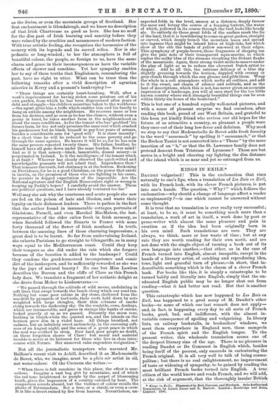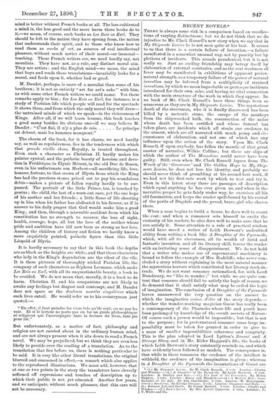KINGS IN EXILE.* DAUDET vulgarised ! This is the exclamation
that rises naturally to one's lips, when a translation of Les Bois en Exil, with its French look, with its clever French pictures, is put into one's hands. The question, " Why ? " which follows the exclamation—why should a change of language affect a reader so unpleasantly ?—is one which cannot be answered without some thought.
It is true that no translation is ever really very successful ; at least, to be so, it must be something much more than a translation, a work of art in itself, a work done by poet or prose-writer with almost the same pleasure and pain in creation as if the idea had been originally born in his own mind. Such translations are rare. They are always, we think, more or less waste of time ; but at any rate they are worth reading for their own merit, and are not done with the single object of turning a book out of its own language into another,—that other, as in the case of French turned into English, almost incapable, except in the hands of a literary artist, of catching and reproducing idea, tone, light and graceful turn of phrase,—in short, that in- describable something which is the charm of a clever French book. For books like this, it is simply a catastrophe to be turned baldly and literally into English, simply that the un- educated English public may be no longer shut out from reading—what it had better not read. But that is another question.
This catastrophe which has now happened to Les Bois en Bzil, has happened to a good many of M. Daudet's other books—to some of which our last remark does not apply— and, in fact, is happening every day to all sorts of French books, good, bad, and indifferent, with the almost in- variable consequence of spoiling and vulgarising. In library lists, on railway bookstalls, in booksellers' windows, we meet them everywhere in England now, these mongrels of the French spirit and the English tongue. To the present writer, this wholesale translation seems one of the deepest literary sins of the age. There is no pleasure in reading Daudet or De Goncourt in English which, besides being itself of the poorest, only succeeds in caricaturing the French original. It is all very well to talk of being cosmo- politan ; but there is no real enlightenment, no improvement of taste or widening of sympathy, to be gained by reading the most brilliant French books turned into English. A true citizen of the world knows and reads French, and we will add, at the risk of argument, that the thoroughly insular British • Kings in Exile. Illustrated by Biel. ConcoM, and Myrbach. Sole Authorised. Translation._ Laura Ensor and E. Bartow. London : Boutledge and lions. Limited. 1890.
mind is better without French books at all. The less cultivated a mind is, the less good and the more harm these books do to it,—we mean, of course, such books as Les Rois en Exit. They should be left to the nation they have sprung from, the nation that understands their spirit, and to those who know how to read them as works of art, as sources of real intellectual pleasure, without much notice of their moral—or immoral— teaching. These French writers are, we need hardly say, not moralists. They have not, as a rule, any distinct moral aim. They are artists : and the English mind—we mean, the mind that buys and reads these translations—invariably looks for a =oral, and feeds upon it, whether bad or good.
M. Daudet, perhaps, is more of a moralist than some of his brethren; it is not so entirely "art for art's sake" with him, as with some other French writers we could name. Yet these remarks apply to him ; for Lea Bois en Emil, for instance, is a study of Parisian life which people will read for the spectacle it shows them, and from which the only moral they will draw— the untrained minds of which we speak—is the viciousness of Kings. After all, if we will learn lessons, this book teaches a good many besides its obvious one—if we may believe M.
Daudet : " C'est fini, it n'y a pins de rois Le principe est debont, mail les hommes manquent."
The charm of the book, for it has charm, we need hardly say, as well as repulsiveness, lies in the tenderness with which that grande vieille chose, Royalty, is treated throughout. Even such a character as Christian II. hardly makes his painter cynical, and the pathetic beauty of heroism and devo- tion in Frederique, in Elysee Memut, in the old Due de Rosen, even in his unfortunate son Herbert—all sacrificing life, love, honour, fortune, to that crown of Illyria from which the King has had the precious stones prized out to pay his scandalous debts—makes a picture of fallen royalty hardly to be sur- passed. The portrait of the little Prince, too, is touched by genius ; the child, the last of a worn-out race, yet the one hope of his mother and her friends ; a little flame of life shooting up in him when his father has abdicated in his favour, as if in answer to his daily prayer that God would make him a good King ; and then, through a miserable accident from which his constitution has no strength to recover, the loss of sight, health, courage, hope, all but the love of the mother whose pride and ambition have till now been as strong as her love. Among the children of history and fiction we hardly know a more exquisitely painted, pathetic figure than this little Leopold of Illyria.
It is hardly necessary to say that in this book the depths are as black as the heights are white, and that those characters who help in the King's degradation are the vilest of the vile. It is these pictures of thoroughly wicked Parisian life, the company of such characters as Sephora Leemans, which make Les Rois en Exit, with all its unquestionable beauty, a book to be avoided. We do not mean that, morally, it is a book to do harm. Christian II. and his companions are not likely to awake any feelings but disgust and contempt, and M. Daudet does not spare us the douleurs morales singulieres which such lives entail. He would refer us to his countryman just quoted :—
"En effet, it faut peindre lea vices tels qu'ils sont, ou no pas les voir. Et si le lecteur ne porte pas en lui un guide philosophique et religieux qui l'accompagne dans la lecture du livre, tart pia pour lui."
But unfortunately, as a matter of fact, philosophy and religion are not carried about in the ordinary human mind, and are not always present when it sits down to read a French novel. We may be prejudiced, but we think they are even less likely to preside over the reading of a translation. As to the translation that lies before us, there is nothing particular to be said. It is very like other literal translations, the original blurred and coarsened in effect,—a remark which also applies to the reproduced illustrations. We must add, however, that at one or two points in the story the translators have cleverly softened off expressions and touches of description up to which their public is not yet educated. Another few years, and we anticipate, without much pleasure, that this care will not be necessary.



































 Previous page
Previous page